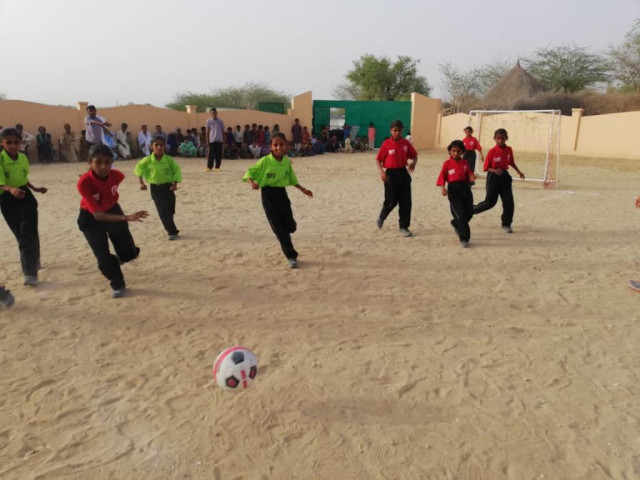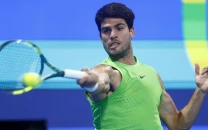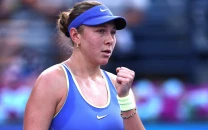When football quenched the thirst of Thari girls
Female players fall for world’s most popular sport after just one school-level tourney

BEYOND EXPECTATIONS: The locals’ embracement of the world’s most popular sport — that they never knew of — can only be explained as life-changing. PHOTO COURTESY: DIYA FC
The growth of the game within two weeks of the first inter-school tournament held in the remote village of Mansingh Bheel with the arid scenic beauty of the desert, the land of camels, peacocks and coal was astounding.
The locals’ embracement of the world’s most popular sport — that they never knew of — can only be explained as life-changing.
"We didn't know what football was till April this year, now it is a part of our lives," Hanif Jumman, the coach of the winning team of the tournament said.
The team was a combination of the teams of Jidodar and Thario villages.
Since the event on June 9, Jumman has now cultivated a group of 13 female footballers now from what started out with just five girls who took part in the tournament. "This was the first time we ever saw any football tournament, let alone to be a part of it. I even held my own tournament last week, just the girls."
The girls played in a league format, between five teams, and for the first time in front of their parents, wearing team shirts and tracks over their traditional dress and playing shoes. The equipment was provided by Diya FC in collaboration with Right to Play and Women Win as each participant also received the kit and a football to take home.
Hanif is one of the coaches, but primarily a teacher at the Thar Foundation schools. He revealed that it was a life-changing experience for him and for everyone else who were involved.
Hanif, 22, along with other teachers were first coached by Karachi's Diya Football Club in April, who ventured into the desert with a dream to change the construct of the society by introducing football to girls in order to empower them.
Like the girls, the coaches are young as well — mostly under the age of 25.
The event itself was a revolution of sorts, where the Thari women, who wear their traditional white bangles and make sure that their faces remain veiled, saw their daughters compete on the field — something that would have been unimaginable before.
"I'm watching the football World Cup now and I want to see my girls play more, although the World Cup is for men but I want the Thar girls to play at that level too. In fact I've started to dream of playing football at the best level as well, it’s just that powerful. The people have begun to see the change too. The mothers want their daughters to play, the fathers are bringing their children to play, and that is just a start," explained Hanif.
Victory after victory
Hanif said that right before the tournament one of the girls backed off because the parents were not ready to see their daughter on the field.
"It was heart-breaking at first," said Hanif. "We had worked with the parents first to get their consent and let them get comfortable with the idea of what football is, and the competition, but again, it is the traditional values of our society that come in the way. However, when we returned to our village with that big trophy, the same parents came to me to induct their daughter back in the team, and I felt we've truly won at that point. I've gotten more girls and even boys to come to the training sessions now that we have every day after the school."
While changing mind-set is one battle, it is the hot climate of the region that has worked in favour of the coaches and the girls. The training sessions are kept after school in the evening, before the sunset, due to the high temperatures during the day, giving a chance to the students to experience sports on its own apart from their school curriculum.
Like Hanif, Zakaullah, who is a 22-year-old teacher from Thario and coach of one of the team, added that just preparing for the tournament was arduous as the parents had to be prepared to watch their girls perform.
"There has been a change in each one of us, even the men,' said Zakaullah. “The confidence in of the girls has increased, now they play with their brothers."
The tournament itself was a spectacle on its own, making history more so, as the girls began with hesitation but without compromising on the enthusiasm.
The heavily veiled mothers sitting on the chairs saw their daughters in awe as they dealt with the ball, played as a team on the field, and even their fathers were cheering.
It was the parents’ first experience a football tournament — an experience that can be more precious than watching the World Cup with the biggest teams on the planet.
The win for Hanif and Zakaullah can be best described with the fact that their combined team looked the most confused in the first few minutes of the match, but then went on to win the tournament, topping the group matches and then getting through to the final.
"The challenge was to understand the rules first, ourselves, and then explain it to the girls. And the greatest thing here is that we the coaches and the players are growing together, said Zakaullah. "They did seem confused in the beginning because the nerves kick in, we were nervous too, trying to make them follow the rules, it was the first time for us all.”
The firsts matter
Football has been a love at first sight for the girls and the top-scorer of the tournament Sherbano said she cannot wait to have a career in the sport, while finishing her education.
"My mother would be proud, I want to play this, my father isn't there, he passed away but he would've liked it too. I just like the feeling of scoring the goals, that first goal," said the fourth-grader who scored three goals for her team with Aban Ho Tar's Jamna.
Other scorers in the tournament included Mansingh Bheel's Dhapu and Khario Jani's Marvi.
Meanwhile, another player Balktawar's mother, who came with her husband to watch the match, said that she wants her daughter to continue playing football and traditions can survive with modernity.
"I want my daughter to play, I'm just surprised that girls can play this way too, her father is excited as well. We need to embrace the change,” she said.
On the other hand, women from Mansingh Bheel, the school that took third place, with limited vocabulary but shining eyes feel that the game was good entertainment and something to look forward to.
Pushing it forward
Diya FC took on the challenge of taking football to Tharparkar on the invitation by the Thar Foundation's education manager Sabeen Shah, who herself have been rigorously working in the community.
"We wanted to start with the girls," said Diya FC founder Sadia Shaikh. "The tournament happened now, on our seventh visit. In the first few visits we worked with the girls and then the coaches; we got the teachers involved who then showed promising results. Now we want to hold an inter-district girls tournament later this year, because we can't just do it once and forget about it."
Shaikh says the talent in the players is inspiring and she wants the girls to get involved and play in club's junior teams and hopefully at the provincial and national levels too.
"The coaches are eager and there is a lot of talent, this was just the first tournament and they gave their all, just the fact that they overcame their shyness, followed the rules, made all the right moves, and learned from the experience is encouraging," said Shaikh.
On the other hand, Haresh Kumar, the teacher at Mansingh Bheel school, who proudly saw his students play concluded that the country shouldn't forget Thar as it is more than meets the eye.
"You see this tournament, you see the players; one thing about people of Thar is that we give our all, our best, and we want to change. I only learned the English alphabets when I travelled to Islamkot form my village in sixth grade. We are far behind, but we need opportunities, look at us, we didn't know about football till few months ago and now we are following it on the internet and television. It is time our country understand that we are more capable than we are perceived. We do everything whole-hardheartedly, with all our might, but we need opportunities," said Haresh.



















COMMENTS
Comments are moderated and generally will be posted if they are on-topic and not abusive.
For more information, please see our Comments FAQ